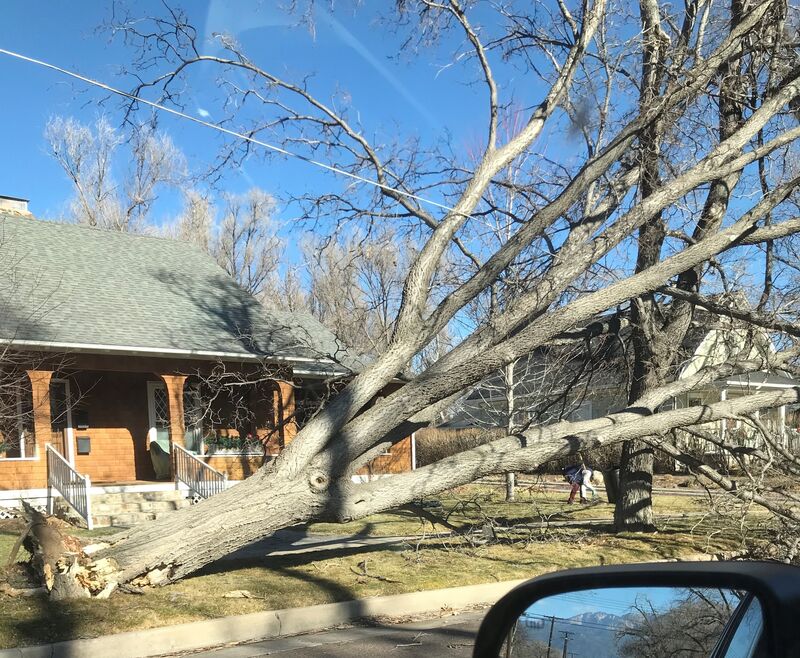
I am writing this blog from a hotel room. I am not traveling for another bike race, nor am I traveling for work. I’m writing from a hotel room because a strong windstorm passed through Colorado on December 15th that caused a lot of damage to my neighborhood. My house has been without power for around 24 hours at the time of writing. I am very fortunate that my dad offered to use his frequent traveler points to book a hotel for me to stay in overnight. Being mid-December, living in a space with no electricity, heat, or lighting for the 14 hour of darkness each night was not appealing. I’m extremely grateful to have access to a warm bed and environment to work from.
As humble as I try to be, it’s impossible to not take access for granted in daily life. Electricity is always there, for the most part. Being without electricity at this time of year really makes me appreciate how good I have it most of the time. I have entertainment and the ability to live life the way I see fit after the sun goes down. In these moments, I try to reflect on how much I depend on these basic utilities. I try to use this situation to empathize more closely with people who have needs due to disability which they do not always have access to. I need heat during the winter. How is that different than a person with PTSD who needs their service animal to calm them during a panic attack? I need light to shower with reasonable safety. How is that different from the person who has had a stroke and require grab bars to shower with reasonable safety? Fundamentally, it’s not different. The only real difference is what is fully embraced as normal to everyone and what is critical for the needs of specific individuals. Many times, these needs are denied to people with disabilities because of a bias. This creates more barriers for people with disabilities who need these modifications to live a normal life. We get a lot of calls that come in for housing issues. A lot of people have to fight with their management to gain access to these necessities. When you boil down the reasons the management imposes barriers for people with disabilities, it’s usually because they just don’t want to empathize, an indifference which is given priority over having tenants who can live fully within their homes.
People create blanket policies because they don’t want to consider other people on an individualized basis. I’m not stating that policies are fundamentally a bad thing. Policies are an effective tool to make processes more efficient. But policies should not replace rational human thought. There are no blanket policies than can reasonably cover every possible circumstance. Policies should be reconsidered and altered where necessary and reasonable. Many people rely on policy as a matter of business conduct and tend to present that information as if it were a law that they can do nothing about. This is not true. Policies are just a way of doing business. Where policies violate actual laws, they cannot reasonably stand. Policies do not override civil rights.
I was supposed to fly to California, but the weather had other plans. It was a situation where I had no control, and just had to go through the motions to do what I could and accept that my trip had to be canceled for that day. After understanding the situation, I had to stand in the customer service line for about 90 minutes to get my bags sent to baggage claim and call for a ride home. I tried my best to empathize with how people in wheelchairs used to be (and sometimes still are) treated with a lack of access to transportation.
Driving home from work, to and from the airport, and to the hotel I was able to witness a lot of the wind damage in and around my neighborhood. It was difficult to drive at times because of the branches and sometimes entire trees that had been blown into the middle of the road. It simply took longer to get anywhere I wanted to go, and I wasn’t always sure the way I wanted to go was going to be passable. This experience resonated with me the experience that wheelchair users have always had as pedestrians using sidewalks.
At the ADA Center, we know a lot about antidiscrimination laws and why they exist. I wouldn’t say that knowing is the same as empathizing, though. Being involved with the ADA Center has opened my eyes to the experiences of others. These types of occurrences in life open the door for true empathy. I believe empathy is a skill that everyone could be better at, which takes conscious practice, and would remove so many barriers in life by its own virtue. I always try to pull out the positive from negative situations and I’ll do my best to carry this one moving forward.